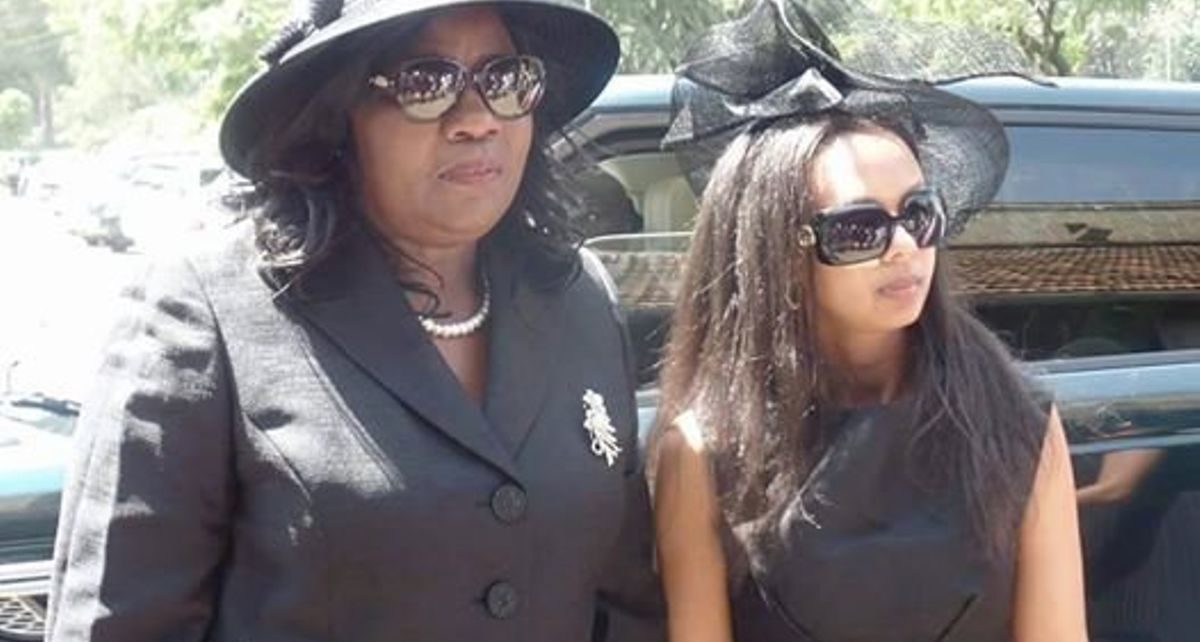The Raila family seems to have issues with widow Lwam Bekele inheriting hundreds of millions after three year marriage
By Shifa Mwihaki
Feature Writer/Essayist
It might appear like drawing the winning card at a lottery when a commoner marries into a wealthy, prominent family.
But more often than not, the outsider ends up crying in the toilet once the spouse, mostly a scion of the political or business dynasty, dies and the family lungs in for the outsider’s share of inheritance.
The current court dispute pitting the Raila Odinga family against Lwam Bekele, the Ethiopian widow of the late Fidel Odinga who died in 2015 without a will, is no different.
Raila’s wife Ida and daughter Winnie Odinga moved to court this year to block Lwam from being the sole administrator of Fidel’s estate which include their Karenhome which was at Sh75 million in 2015. There areparcels of land, money in bank accounts, high end cars and shares in private companies.
Ida and Winnie want to be enjoined in the administration of the properties on grounds that Fidel had twins with another woman, Phoebe Akinyi, and with whom he sired twins who were born six months after his death.
Lwam argues that the case has inconsistencies considering Ida and Winnie had indicate in their objection papers that Fidel was supporting the twins, yet they were not born by the time of his death. Their birth certificates also don’t name Fidel as the father.
Lwam perceives the suit by the Odingas as a ploy to repossess or co-share Fidel’s property especially their Karen home which she says is now her property since she co-owned it when Fidel was alive.
The case is still ongoing.
Why do prominent families gang up against outsiders who become part of the family through marriage?
Well, for one, there is always battle for the property of the deceased. There are no inheritance disputes in case of couples who bought more shoes than tires.
The said properties were mostly acquired over time before the outsider came into the picture.
Lwam Bekele married Fidel in 2012, a year after he divorced Veronica Wanjiru whom she had married in a high profile traditional wedding. Veronica is from the prominent Wangunyu family. James Wangunyu, owner of Standard Investment Bank is her uncle and in whose home in Muthaiga the wedding was held in 2007. They had no children.
Lwam had only been married for three years to Fidel and had a one year old son at the time of his death.Ida in her suit papers Ida named Winnie, Fidel’s sister, as the other beneficiary of his estate.
Were the properties too much an inheritance for such a young widow who could remarry, get more children?
Prominent families view outsiders as meddlers, lucky default beneficiaries
Prominent families, it appears, view outsiders as meddlers, lucky default beneficiaries and gate crashers with the simmering bad blood finding a vent after the outsider is exposed following the death of the benefactor. To get rid of the outsider, they often employ their money and connections to ‘deal’ with them considering they have no equal financial muscle.
But the most important reason they have issues with outsiders has to do with the psychology of the propertied classes.
American sociologist Prof J John Palen informs us in, Social Problems, his Magnum Opus of 1979, that the wealthy have different mindsets, different attitudes and insiders are an extension of the members and their class-bound prerogatives of money and power.
In these closely knit circles, he notes “there is strong in-group solidarity and it’s clear to the members who is and who is not included.”
American sociologist C Wright Mills notes in his 1956 book, Power Elite that old money is about three things: wealth, power and prestige, and unless an outsider is adding to any of the three then acceptance becomes the first bottleneck.
The unique culture of the upper-classes is such that wealth governs their minds and no matter where they go and what they become they never lose their sense of entitlement and identity and as Mills notes “without conscious effort, they absorb the aspiration to be – if not the conviction that they are- The Ones Who Decide.”
Schools which read like an embarrassment on CV
Mills further notes that being part of the upper classes is in itself, a certificate of social position where activities are tacitly coordinated between the accepted since the upper-class is the only class with real boundaries and even manages to keep off the nouveaux rich who are not yet part of the ‘establishment’.
Things get worse for those who attended schools which read like an embarrassment on the CV and whose parents surnames don’t ring a social, economic or political bell.
Mills furthers informs that “in the inner circles of the upper classes, the most impersonal problems of the largest and most important institutions are fused with the sentiments and worries of small closed, intimate groups” and outsiders who got in through marriage are viewed as being part of ‘The Set.’
The scenario only gets tricky if one is from a different ethnic group or nationality with differing customs.
Besides Lwam Bekele, Kenya has witnessed other victims who did not find marrying into the wealthy a rosy ticket to Easy Street.
They include stone mason Peter mbugua, when in his 20s married freedom fighter, politician and women rights activist Wambui Otieno, 42 years his junior in 2003. Wambui died in 2011 and Mbugua was chased away by Wambui’s prominent Waiyaki family like a village mongrel which had gatecrashed into a ruracio.
Mbugua confessed he married Wambui out of love and not for her wealth
But in 2012, Peter Mbugua went to court after Wambui Otieno’s family threw him out their Karen home and in the other one in Upper Matasia where Wambui was buried as Mbugua sobbed uncontrollably, holding on to the casket as it descended into the grave atop the lowering gear.
Despite the Waiyaki family, specifically former Foreign Affairs Ministers Dr Munyua Waiyaki, now deceased, thanking him for being with his sister in her old age and hours of need, Mbugua still felt shortchanged when the will was read.
Mbugua confessed he married Wambui out of love and not for her wealth.
The will Wambui wrote just 72 days before her death shows she bequeathed Mbugua with two plots in Kitengela and a car to enable him “move around in his day-to-day endeavours”.
The will was witnessed by Wambui’s lastborn sister who lives in Canada, Esther Waiyaki, and a friend, Elizabeth Njeri Gichimu, and is certified by lawyer R.K Ng’ethe.
After Wambui’s death, Mbugua was chased out of their Forest Edge home in Karen and the only thing he got from the will was an old car, a Toyota G-Touring and the two plots in Kitengela.
Mbugua has since remarried and has three children with Anne Wangari Njuguna.
Wambui was the widow of prominent criminal lawyer the late SM Otieno and both were so networked they were among the few private citizen invited to Kenya’s Independence Day Celebrations on December 12, 1963.
SM Otieno died in December 1986 and the court battle over whether to bury him at his rural Nyalgunga home in Luo Nyanza or Upper Matasia where he had bought a six acre farm and which was his preferred final resting place.
“To bury me in Nyalgunga away from my children,” S.M. Otieno often told family and friends, “is to throw me a way,” writes Blain Harden in Africa: Dispatches from a Fragile Continent.
The argument was that the clan “owns” the body, irrespective of the wishes of the dead and the ensuing burial dispute kicked off one of the most famous court cases in Kenya’s history in 1987, the year Kenyans learnt more about women’s rights, class relations, ethnicity, cross-cultural marriages and the place of African traditions in our lives, than any other time since independence.
The other similar case involves Udi Gecaga, the father of Jomo Gecaga, President Uhuru Kenyatta’s Personal Assistant
Wambui lost the case to Otieno’s Umira Kager Clan in a dispute which engrossed Kenyans for five months as SM Otieno lay at the City Mortuary which matatu touts nicknamed ‘Stage ya SM.’
Wambui remained single until she married Mbugua at the Attorney General Chambers and later at the All Saints Cathedral in Nairobi.
The marriage was rocked with many untoward bends including the death of Mbugua’s mother who was shocked her son had married a woman older than her. She was 53 at the time, Wambui was bending her late 60s.
Exit Peter Mbugua and enter Udi Gecaga.
He is the father of Jomo Gecaga, President Uhuru Kenyatta’s Personal Assistant and his nephew since Jomo’s mother, Jeni Gecaga, is Uhuru’s half-sister.
Udi’s other child, Nana Gecaga, is the CEO of the iconic Kenyatta International Convention Centre, a State corporation.
Udi was the one-time chairman of Lonrho East Africa and son of Bethuel Mareka Gecaga,one of Kenya’s pioneering indigenous corporate honchos.
Bethuel Gecaga lost his wife, Jemimah Gecaga in 1979. Jemimah was the sister to foreign Affairs Minister Dr Njoroge Mungai, founding President Mzee Jomo Kenyatta’s personal physician.
Transfer of the properties was tainted with “fraud, undue influence
Bethuel Gegaca died in 2016 and Udi moved to evict his stepmother Margaret Gacigi Gecaga from the palatial Muthaiga residence which she had shared with his father for nearly 10 years.
Udi demanded that Margaret vacate the Muthaiga home after the arbitrators appointed by the High Court ruled that the Muthaiga house and seven adjacent properties were not part of the matrimonial property, and therefore Gecaga had no claim to them.
Udi slapped her with a Sh9 million rent bill accrued since his father died. The arbitration ruling aside, more legal battles loom over the rest of Bethuels vast wealth in land, real estate, farms and shares in various blue-chip corporations.
Margaret appealed the arbitration.
When Bethuel remarried he was 82, Margaret was 69 but had been his live-in partner for many years. The marriage was boycotted by Udi and his sister Mary who lives in Germany nor Udi’s children who besides Jomo and Nana include Soiya Gecaga.
But witnesses included Dr Njoroge Mungai and Joyce Gathoni Wamae. Mungai was also on the original panel of arbitrators when the hearing started in 2014, but died midstream and was replaced by his brother, Ngethe Njoroge, Kenya’s first High Commissioner to the UK.
Margaret’s main grounds of complaint, according to the suit papers, was that the transfer of the properties was tainted with “fraud, undue influence, misrepresentations on the part of the respondents”.
Margaret submitted evidence that Udi had for a long tried taking control of the property from his elderly father, who had, in the past, even disowned transfer documents and other instructions allegedly issued without his knowledge.
While no one disputed she was Bethwel’s legal wife since 2007, Udi disputed that Margaret had cohabited with his father after his mother’s death in 1979 and that she only came into his life not long before the marriage after she was hired to nurse him when he started ailing.
Margaret was among the first African nurses to rise to the topmost ranks in the public health sector, and takes pride in having cared for Mzee Jomo Kenyatta in his old age. She is still popularly known as ‘Matron’.

